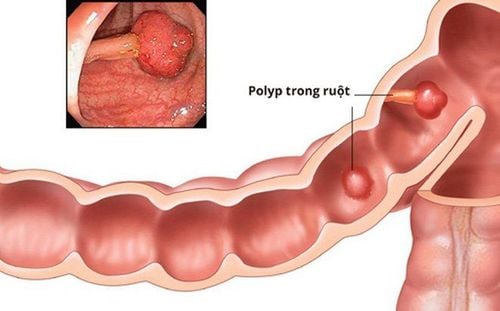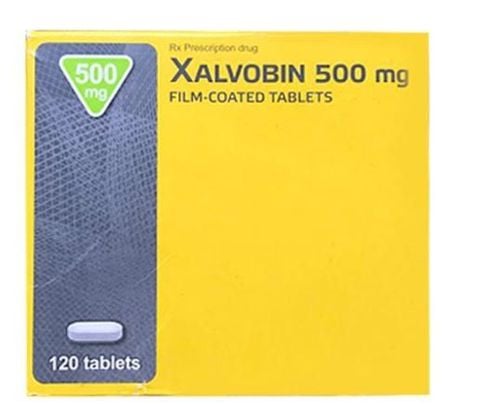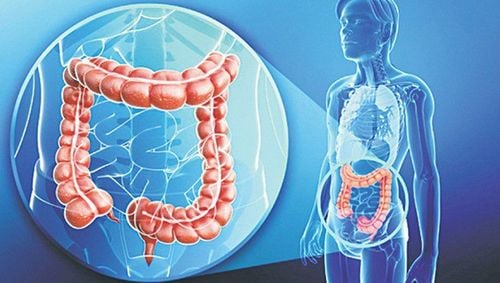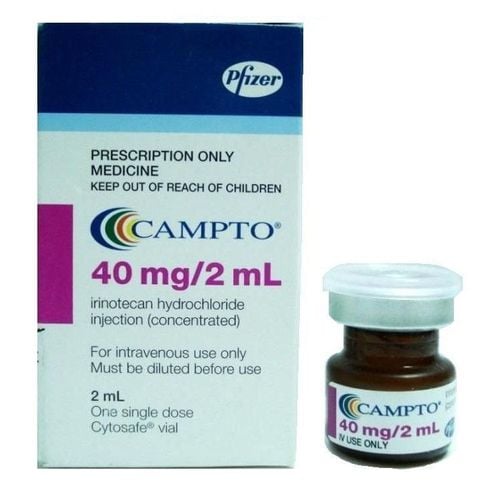This is an automatically translated article.
The article is expertly consulted by MSc Duong Xuan Loc - Gastroenterologist - General Surgery Department - Vinmec Danang International General Hospital.Colorectal cancer, if detected early, has a good prognosis with radical surgery. Any delay in surgery will lead to more serious and sometimes late conditions.
1. Where is the colon and what is its function?
The rectum is the large intestine at the end of the alimentary canal that connects to the small intestine. The colon consists of five segments: the right ascending colon from the small intestine to the hepatic angle, then the transverse colon extending to the splenic flexure, and the descending colon on the left, which descends into the sigmoid colon, continuing with the terminal portion called the colon. rectal.During the movement in the colonic lumen, the remaining products of food digestion are reabsorbed water - electrolytes, concentrated and stored before being expelled through the anal opening.
2. What is colorectal cancer?
Colon cancer (also known as colorectal cancer, colon cancer) is a disease that begins in the colon, rectum or cecum, caused by the abnormal growth of cells capable of invade or spread to other parts of the body. Manifestations are usually intermittent abdominal pain, constipation, defecation, defecation or sometimes loose stools, black stools.Colorectal cancer has a very strong ability to metastasize. The organs most often metastasized to are liver, lung, bone, brain; including the liver. When the disease is detected at a late stage, that is, the cancer has metastasized, the prognosis is often very limited.
3. What is the radical surgery method for colorectal cancer?
For colorectal cancer, if detected at an early stage, surgery with the goal of removing the entire tumor will help improve the prognosis very well. Colectomy surgery will be performed under general anesthesia, the patient lies supine and mechanical ventilation through the endotracheal tube.Two methods of colorectal resection are being applied today, through open surgery and laparoscopic surgery. Depending on the choice of the specific patient, the anatomical structure of the bowel segment to be intervened, the complexity of the pathology, the surgeon will consider choosing the appropriate method.

3.1 Open surgery
3.1.1 Methods
The colorectal segment to be resected will be approached by the surgeon through a long line along the white line in the middle of the abdomen.3.1.2 Advantages
The surgery area is wide, the technicians can easily manipulate the tumor, and the intestines can be easily accessed.3.1.3 Cons
Long surgical scar, risk of infection, bad scar healing.3.2 Laparoscopic surgery
3.2.1 Methods
The intestine will be interfered with remotely and observed on the screen through small, sophisticated instruments inserted into the abdomen by very small incisions on the abdominal wall.3.2.2 Advantages
Quick recovery of colon function, less pain after surgery, short hospital stay, quick return to normal activities, small surgical scars, high aesthetics.3.2.3 Cons
The surgical field is narrow, requiring experienced surgeons and good supporting equipment.However, either way, the general rule is to remove the diseased intestine and sew the two ends of the healthy intestine together. If the suture cannot be sutured due to the location and extent of the lesion, the surgeon will do an colostomy. This is only temporary to give the colon time to heal, after which surgery will be performed to close the anus temporarily. In other cases, the segment of bowel that must be removed extends all the way to the anus, requiring permanent anal reconstruction on the abdominal wall.
4. What to note about colorectal cancer surgery methods?
4.1. Preparing for surgery
Because this is a major surgery, the patient needs to have a general examination of the organ system functions as well as a pre-anesthesia examination a few days before surgery to be able to tolerate the surgery.Because all interventions on the colon carry a high risk of infection, in addition to cleaning the surgical site by bathing with Betadine antiseptic solution the night before and the morning of the same day of surgery, the patient was also given standard instructions. prior colon cancer to reduce the risk.
Specifically, in the few days before surgery, the patient needs to eat liquid, soft food that is easy to digest quickly. Up to 24 hours before surgery, the patient can only drink water, such as sugar water, juice, boiled meat juice and will fast completely from midnight before the day of surgery. At the same time, the patient will be given oral medications and replacement fluids to avoid water-electrolyte disturbances when diarrhea continues afterwards.
In addition, the patient is also indicated to take oral antibiotics a few days before surgery. All of this is aimed at maximal colon cleansing to reduce the risk of intra-abdominal infection during surgery.
4.2. Recovery after surgery
After the colectomy is completed, the patient will be sedated and transferred to the postoperative care unit for close monitoring until he regains consciousness before being transferred to the ward.To help restore bowel function, facilitate bowel movements and facilitate blood circulation, all patients should be encouraged to get up and move as soon as possible on the first day after surgery. Only then can the patient be gradually reduced to parenteral nutrition and start eating a light meal and then return to eating normally when there are signs of defecation.
If the bowel function recovers well, the incision is favorable, usually after one to two weeks, the patient can be discharged. If laparoscopic surgery, this time will be shortened.

4.3. Risks of colorectal surgery
As with any other surgery, colorectal cancer surgery also carries the risk of complications such as pneumonia, prolonged mechanical ventilation, urinary tract infection, wound infection, myocardial infarction, and embolism. vein...However, for colorectal cancer surgery, the risk of infection in particular will be even higher due to the intervention in the colon lumen, which is a place of waste and many germs. On the other hand, intra-abdominal surgery can also damage nearby structures and organs, causing bleeding, peritonitis, nerve compression...
Due to bowel resection and rejoining surgery, there is a risk muscle leak fistula, causing the digestive tract to lose its integrity, the fluid in the intestinal lumen leaks out, forming an intra-abdominal abscess. Sometimes the anastomosis is too small, when it heals, it creates scar tissue, narrowing the intestinal lumen, causing intestinal obstruction. These cases require surgical intervention.
5. Advances in colorectal cancer surgery at Vinmec
Colonectomy and rectal resection in the radical treatment of cancer have been widely performed for many years at Vinmec International General Hospital. The success rate of these surgeries is always above 90%. In particular, the common complications of this type of surgery occur with a very low rate, such as bleeding complications requiring reoperation only 1%, the rate of anastomosis is less than 5%.To do so, patients are given priority to apply laparoscopic surgery instead of open surgery. Since then, patients have greatly benefited from this method with Vinmec's laparoscopic surgery system being the most modern in the region, equivalent to developed countries in the world, in which, the most prominent is the machine. Karl Storz Full HD endoscope and Stapler Covidien automatic suture device make the operation of the surgeon more convenient, shortening the surgery time. Not only that, the medical instruments and supplies used in surgery are products that are selected very carefully and must be of the best quality on the market.
Therefore, although hospitals in the area are also gradually implementing this technique, the quality of service at Vinmec International General Hospital is still more perfect, worthy of international standards but extremely expensive. compete.
The success of surgeries in general at Vinmec International General Hospital, colectomy surgery, and rectal resection in particular is also due to the well-trained doctors and surgeons of Gastroenterology. experience can perform independently on thousands of operations.
Master, Doctor Nguyen Ngoc Thang - Gastroenterologist, Vinmec Da Nang International General Hospital. With 17 years of experience in the field of gastrointestinal and hepatobiliary surgery, and over 9 years of endoscopic interventional experience, especially the technique of endoscopic retrograde cholangiopancreatography (ERCP) with a large number of patients. over 800 cases. Master, Master Duong Xuan Loc - Gastroenterologist, Vinmec Da Nang International General Hospital. With more than 12 years of experience as a gastroenterologist, he has won many certificates of merit from the Minister of Health as well as scientific and technological conferences, the Vietnam Young Doctors Association... In addition, he also has many Research work on abdominal surgery, mainly focusing on laparoscopic techniques. In addition, the nurses and aides of Vinmec International General Hospital wholeheartedly care and support to help reduce pain for patients, support early movement so that bowel function can recover quickly and return to normal bowel function. nutrition and daily life.
Colon - colorectal cancer today is no longer a heavy obsession if it is detected in time and radical surgery is performed. However, to have an effective surgery, the patient needs to have certain knowledge about this surgery and choose a reputable hospital.
Please dial HOTLINE for more information or register for an appointment HERE. Download MyVinmec app to make appointments faster and to manage your bookings easily.














